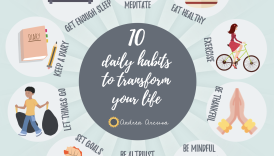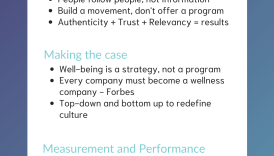Healthy Habits for a Happier Life: Tips and Tricks

Importance of Healthy Habits
In our fast-paced world, adopting healthy habits is crucial for overall wellbeing. Engaging regularly in physical activities, maintaining a balanced diet, and prioritizing emotional health can significantly enhance quality of life. For example, someone who incorporates even 30 minutes of exercise into their daily routine often reports increased energy levels and improved mood.
- Healthy Habits for a Happier Life: Tips and Tricks
- Importance of Healthy Habits
- Benefits of a Happier Life
- Physical Health Habits
- Regular Exercise
- Balanced Diet
- Mental Health Habits
- Stress Management
- Mindfulness Practices
- Sleep and Rest Habits
- Importance of Quality Sleep
- Creating a Restful Environment
- Social Connections
- Building Supportive Relationships
- Engaging in Community Activities
- Time Management
- Prioritizing Tasks
- Setting Boundaries
- Personal Development
- Lifelong Learning
- Setting Achievable Goals
- Stress-Relief Techniques
- Meditation
- Yoga Practices
- Financial Health
- Budgeting
- Saving and Investing
- Work-Life Balance
- Avoiding Burnout
- Finding Fulfillment in Career
- Healthy Habits for Relationships
- Effective Communication
- Showing Appreciation
- XII. Self-Care Practices
- Practicing Gratitude
- Taking Time for Yourself
- XIII. Healthy Habits for a Happy Home
- Keeping a Clean Environment
- Sharing Responsibilities
- XIV. Emotional Well-Being
- Managing Emotions
- Seeking Professional Help
- XV. Conclusion
- Recap of Healthy Habits
- Committing to a Happier Life
Benefits of a Happier Life
Embracing healthy habits leads to a cascade of benefits, such as:
- Enhanced Mood: Regular physical activity triggers the release of endorphins, promoting feelings of happiness.
- Increased Productivity: A well-balanced lifestyle can improve focus and efficiency, making tasks easier to manage.
- Stronger Relationships: Healthy habits often involve interactions with others, fostering deeper connections and support systems.
Ultimately, committing to a lifestyle centered around healthy habits cultivates a sense of joy and fulfillment in everyday life.
Physical Health Habits
Regular Exercise
To enhance physical health, regular exercise is essential. It’s not only about hitting the gym; finding an activity you enjoy can make all the difference. For instance, a friend of mine took up dancing and found it to be a fun way to stay active. Here are some easy ways to incorporate exercise into daily life:
- Walking: Start with a 15-minute walk after meals.
- Group Classes: Join a local yoga or spin class for motivation.
- Sports: Engaging in sports can be a fantastic way to stay fit while socializing.
Balanced Diet
Complementing exercise with a balanced diet is equally important. It’s about fueling the body with nutritious foods. Think about it as preparing a delicious recipe; a balance of ingredients is key! Consider these simple tips for a healthier diet:
- Fruits and Vegetables: Aim for a colorful plate to ensure a variety of nutrients.
- Whole Grains: Swap out white bread for whole grain options.
- Lean Proteins: Include sources like chicken, fish, or legumes to keep energy levels steady.
Together, regular exercise and a balanced diet form the foundation of a healthy lifestyle.
Mental Health Habits
Stress Management
Moving beyond physical health, it’s crucial to prioritize mental wellbeing, starting with effective stress management. Everyone experiences stress, but managing it can make all the difference. A colleague of mine started using a stress journal to jot down her thoughts and feelings, which helped her gain clarity. Here are some tips to manage stress effectively:
- Deep Breathing: Take a few moments each day to practice deep breathing exercises.
- Time-Outs: Allow yourself short breaks throughout the day to reset your mind.
- Physical Activity: Exercise releases tension and helps clear your mind.
Mindfulness Practices
Mindfulness practices are a powerful way to foster mental health. By focusing on the present moment, individuals can reduce anxiety and improve emotional resilience. For example, I tried guided meditation for just 10 minutes a day and noticed a significant decrease in my stress levels. Consider these mindfulness activities:
- Meditation: Set aside a few minutes each day for meditation or deep relaxation.
- Gratitude Journaling: Write down three things you’re grateful for each day to shift your focus to the positive.
- Nature Walks: Spend time outdoors and practice being fully present in your surroundings.
Incorporating stress management and mindfulness into daily routine can greatly enhance mental wellbeing.
Sleep and Rest Habits
Importance of Quality Sleep
Following mental health habits, quality sleep plays a pivotal role in overall health. It’s during sleep that our bodies repair, recover, and rejuvenate. A friend of mine once discovered that simply improving her sleep quality transformed her energy levels and focus during the day. Consider the benefits of quality sleep:
- Enhanced Memory: Good sleep aids memory consolidation and learning.
- Emotional Wellbeing: Adequate rest helps to regulate mood and stress.
- Physical Health: Sleep supports immune function and overall physical health.
Creating a Restful Environment
To enjoy these benefits, it’s important to create a restful environment. Simple adjustments can promote better sleep quality. For instance, I replaced my old mattress and introduced blackout curtains, which significantly improved my sleep. Here are some practical tips for establishing a sleep-friendly space:
- Comfortable Bedding: Invest in good-quality pillows and mattresses.
- Lighting: Use soft, dim lights in the evening to soothe the mind.
- Noise Control: Consider white noise machines or earplugs to minimize disturbances.
Establishing healthy sleep and rest habits can lead to profound improvements in overall health and wellbeing.
Social Connections
Building Supportive Relationships
Having explored the significance of sleep and rest, another key aspect of a happy life is fostering social connections. Building supportive relationships provides emotional sustenance and enhances resilience. For instance, a close friend of mine organizes weekly catch-ups, creating a safe space to share our thoughts and experiences. Here are ways to nurture these essential connections:
- Regular Check-Ins: Schedule consistent times to connect with friends or family.
- Open Communication: Be honest about your feelings and encourage others to do the same.
- Be Present: Prioritize quality time together, whether through face-to-face visits or digital conversations.
Engaging in Community Activities
Engaging in community activities also strengthens social ties and fosters a sense of belonging. It’s a great way to meet new people and contribute positively to the local area. I personally joined a local book club, which broadened my social circle and enriched my reading experience. Consider these options to engage in your community:
- Volunteer Work: Offer your time to local charities or events.
- Join Clubs or Groups: Explore interests such as sports, arts, or environmental groups.
- Attend Community Events: Participate in festivals or informational workshops to meet like-minded individuals.
Emphasizing social connections can significantly enhance happiness and provide invaluable support in life’s journey.
Time Management
Prioritizing Tasks
Having established strong social connections, effective time management is essential for maintaining balance and productivity. Prioritizing tasks can help manage daily responsibilities without feeling overwhelmed. A colleague of mine swears by the Eisenhower Matrix, which categorizes tasks based on urgency and importance. Here’s how you can prioritize your workload:
- List Tasks: Write down everything you need to accomplish.
- Categorize: Divide tasks into four categories: urgent and important, important but not urgent, urgent but not important, and neither.
- Focus First: Tackle the urgent and important tasks first, leaving others for later in the day.
Setting Boundaries
In addition to prioritizing, setting boundaries is crucial for effective time management. It ensures that personal time is respected amidst various demands. For example, I recently established “no work” zones during the evening, which greatly improved my evening relaxation. Here are some tips:
- Learn to Say No: Politely decline requests that don’t align with your priorities.
- Designate Work Hours: Set specific times for work and stick to them.
- Limit Distractions: Turn off notifications from non-essential apps during focused work time.
By honing these time management habits, individuals can enhance productivity while preserving a healthy work-life balance.
Personal Development
Lifelong Learning
Building on effective time management, personal development plays a key role in continued growth and self-improvement. Lifelong learning is essential for staying current and adapting to change. I remember when I enrolled in an online course about digital marketing; I not only learned valuable skills but also gained confidence. Here are ways to embrace lifelong learning:
- Online Courses: Platforms like Coursera or Udemy offer a wide range of subjects.
- Reading: Set a goal to read at least one book per month on topics of interest.
- Podcasting: Listen to educational podcasts during commutes to feed your curiosity.
Setting Achievable Goals
Additionally, setting achievable goals provides direction and motivation in personal development. Aiming for clear, realistic goals can transform aspirations into reality. For example, a personal goal of mine was to run a 5K race, so I mapped out a training schedule over three months. Here’s how to set effective goals:
- SMART Criteria: Ensure your goals are Specific, Measurable, Achievable, Relevant, and Time-bound.
- Break It Down: Divide larger goals into smaller, manageable steps.
- Regular Review: Periodically assess your progress and adjust your goals as necessary.
By investing in personal development through lifelong learning and achievable goals, individuals can foster a fulfilling and enriching life experience.
Stress-Relief Techniques
Meditation
As individuals embark on personal development, integrating stress-relief techniques is vital for maintaining holistic wellbeing. Meditation is one powerful practice that helps clear the mind and alleviate stress. I recently started meditating for just 10 minutes each morning, and it has transformed my outlook throughout the day. Here are some easy ways to get started:
- Guided Meditations: Use apps like Headspace or Calm for structured sessions.
- Breath Focus: Concentrate on your breath to anchor your thoughts during meditation.
- Consistency: Aim for a regular practice, even if it’s just a few minutes.
Yoga Practices
In addition to meditation, yoga practices provide an excellent avenue for stress relief. Combining physical movement with mindfulness promotes both relaxation and strength. After joining a local yoga class, I found that my stress levels significantly decreased. Consider incorporating these practices into your routine:
- Beginner Classes: Find local or online beginner-friendly classes to ease into the practice.
- Daily Stretching: Even simple stretches at home can help release tension.
- Mind-Body Connection: Focus on the connection of breath with movement to deepen relaxation.
Incorporating meditation and yoga into daily life can effectively combat stress and promote a calmer, more centered existence.
Financial Health
Budgeting
Transitioning from stress-relief techniques, maintaining financial health is equally crucial for overall wellbeing. Budgeting serves as the foundation for managing finances effectively. I remember the relief I felt when I created my first budget; it clarified my spending habits and helped me prioritize savings. Here’s how to set up an efficient budget:
- Track Expenses: Monitor your daily expenses for a month to understand your spending patterns.
- Categorize Costs: Divide your expenses into fixed (rent, utilities) and variable (entertainment, dining).
- Set Limits: Allocate specific amounts for each category to stay within your means.
Saving and Investing
Building on budgeting, saving and investing are essential steps toward financial stability. A friend of mine started saving consistently, and he was amazed at how quickly his savings grew. To enhance your financial health, consider these strategies:
- Emergency Fund: Aim to save 3-6 months’ worth of living expenses for unexpected situations.
- Savings Goals: Set clear savings goals for both short-term (vacation) and long-term objectives (home purchase).
- Invest Wisely: Explore options like stocks, bonds, or mutual funds to grow your wealth over time.
By prioritizing effective budgeting, saving, and investing, individuals can achieve greater financial health and peace of mind.
Work-Life Balance
Avoiding Burnout
As we continue to explore financial health, achieving a healthy work-life balance is essential to avoid burnout. Many of us have experienced overwhelming stress from juggling work demands and personal life. I once found myself constantly working late, which led me to rethink my boundaries. Here are some strategies to help you avoid burnout:
- Set Clear Work Hours: Define specific working hours and stick to them.
- Take Breaks: Schedule regular short breaks throughout the day to recharge your mind.
- Unplug After Hours: Limit work-related communications during your personal time to maintain boundaries.
Finding Fulfillment in Career
In addition to avoiding burnout, finding fulfillment in your career can greatly enhance overall life satisfaction. When I shifted my focus to projects that aligned with my passions, I felt more engaged and motivated. Here’s how you can strive for career fulfillment:
- Assess Your Skills: Identify your strengths and find work that utilizes them.
- Seek Opportunities for Growth: Always look for professional development, whether through courses or new responsibilities.
- Align Values with Work: Choose a career that resonates with your personal values and goals.
By effectively managing burnout and seeking fulfillment in your career, individuals can create a meaningful and balanced life.
Healthy Habits for Relationships
Effective Communication
Continuing from the importance of work-life balance, nurturing healthy relationships is vital for overall happiness. Effective communication forms the cornerstone of any strong relationship. I learned this firsthand when I resolved a misunderstanding with a close friend by simply being open about my feelings. Here are some tips to enhance communication:
- Active Listening: Pay full attention when others speak, and show interest through verbal and non-verbal cues.
- Be Clear and Direct: Avoid vague statements; express your thoughts and feelings honestly.
- Check In Regularly: Schedule time to catch up and discuss any concerns openly.
Showing Appreciation
In addition to effective communication, showing appreciation can strengthen bonds and foster positivity. A small gesture of gratitude can go a long way; I make it a habit to thank my partner for the little things they do, which deepens our connection. Consider the following ways to express appreciation:
- Verbal Praise: Simply saying “thank you” can make someone’s day.
- Thoughtful Notes: Leave surprise notes to express your gratitude.
- Quality Time: Dedicate uninterrupted time to enjoy each other’s company.
By practicing effective communication and showing appreciation, individuals can cultivate more fulfilling and resilient relationships.
XII. Self-Care Practices
Practicing Gratitude
As we transition from healthy habits for relationships, self-care practices are essential for maintaining personal well-being and happiness. One powerful self-care technique is practicing gratitude. Adopting a gratitude journal transformed my perspective on daily life; by noting down three things I’m thankful for each day, I began to appreciate the small joys around me. Here are some ways to incorporate gratitude into your routine:
- Daily Journaling: Write about moments or people you appreciate each day.
- Share with Others: Take time to express gratitude to friends or family verbally or in writing.
- Mindful Reflection: Spend a few moments each day contemplating what you are thankful for.
Taking Time for Yourself
In addition to practicing gratitude, dedicating time for yourself is crucial. Whether through hobbies, relaxation, or simply enjoying solitude, this time replenishes your energy and nurtures your soul. I’ve found that setting aside Sunday afternoons for reading helps me recharge for the week ahead. Consider these self-care strategies:
- Schedule ‘Me Time’: Block off time in your calendar specifically for activities you love.
- Explore New Hobbies: Try cooking, painting, or hiking to discover passions that excite you.
- Unplug Regularly: Take a break from screens to immerse yourself in nature or quiet reflection.
By incorporating gratitude and prioritizing time for yourself, individuals can significantly enhance their self-care routine and overall happiness.
XIII. Healthy Habits for a Happy Home
Keeping a Clean Environment
Following self-care practices, maintaining a happy home environment plays a pivotal role in overall wellbeing. A clean and organized space can foster positivity and reduce stress levels. I remember the relief I felt after decluttering my living room; it made the space feel more inviting. Here are some effective ways to keep your environment tidy:
- Establish a Cleaning Routine: Set specific days for different tasks, such as vacuuming on Thursdays and dusting on Saturdays.
- Declutter Regularly: Dedicate a few minutes each day to organize items and eliminate what you no longer need.
- Involve Everyone: Make cleaning a family activity to emphasize teamwork.
Sharing Responsibilities
In addition to keeping a clean environment, sharing responsibilities among household members can strengthen relationships and lighten the workload. I’ve found that discussing tasks openly with my partner not only divides labor but also fosters teamwork. Here’s how to effectively share responsibilities:
- Create a Chore Chart: Map out tasks with clear responsibilities for each person in the household.
- Communicate Openly: Discuss any preferences or dislikes regarding specific chores to ensure everyone is comfortable.
- Rotate Tasks: Switch up responsibilities weekly to keep things fresh and fair.
By prioritizing cleanliness and sharing responsibilities, individuals can cultivate a happier, more harmonious home environment.
XIV. Emotional Well-Being
Managing Emotions
After discussing healthy habits for a happy home, emotional well-being is a crucial aspect of overall health that deserves attention. Managing emotions effectively can enhance resilience and improve quality of life. I recall a time when I felt overwhelmed during a stressful week; I learned to pause and identify my emotions, which helped me respond rather than react. Here are some strategies for managing emotions:
- Identify Triggers: Keep a journal to note situations that provoke strong emotions.
- Practice Coping Techniques: Use deep breathing, counting to ten, or taking a walk to diffuse heightened feelings.
- Emotional Check-Ins: Regularly assess your emotional state and address any issues proactively.
Seeking Professional Help
In addition to self-management, knowing when to seek professional help is vital for emotional well-being. There’s no shame in consulting a therapist or counselor, as they can provide guidance and strategies tailored to individual needs. A friend of mine benefited greatly from therapy, gaining insights that helped her navigate life’s challenges. Here are some tips for seeking professional help:
- Research Options: Explore therapists, counselors, or support groups available in your area.
- Be Open and Honest: Share your feelings and concerns openly to get the most out of your sessions.
- Follow Through: Implement the strategies discussed in therapy into your daily life for lasting benefits.
By managing emotions and seeking professional help when needed, individuals can foster greater emotional well-being and resilience.
XV. Conclusion
Recap of Healthy Habits
As we wrap up our exploration of various healthy habits, it’s essential to recall the fundamental practices that contribute to overall well-being. From nurturing supportive relationships and practicing self-care to maintaining financial health and emotional resilience, each aspect plays a vital role. Personally, implementing small changes, like practicing gratitude or establishing a cleaning routine, has proven impactful in my life. Here’s a recap of key habits to consider:
- Physical Activities: Regular exercise and balanced diets.
- Mental Health: Stress management and mindfulness practices.
- Financial Planning: Budgeting and investing.
Committing to a Happier Life
Committing to a happier life requires dedication, but the rewards are worth it. It’s important to start small and build upon these habits, gradually intertwining them into daily life. Whether it’s setting aside time for self-reflection or prioritizing quality sleep, every step you take leads to enhanced well-being. Engage with those around you, seek professional guidance when needed, and embrace lifelong learning. Remember, your journey to a happier life is unique—embrace it fully and enjoy the process. The effort invested in cultivating these healthy habits will resonate positively throughout your life.





